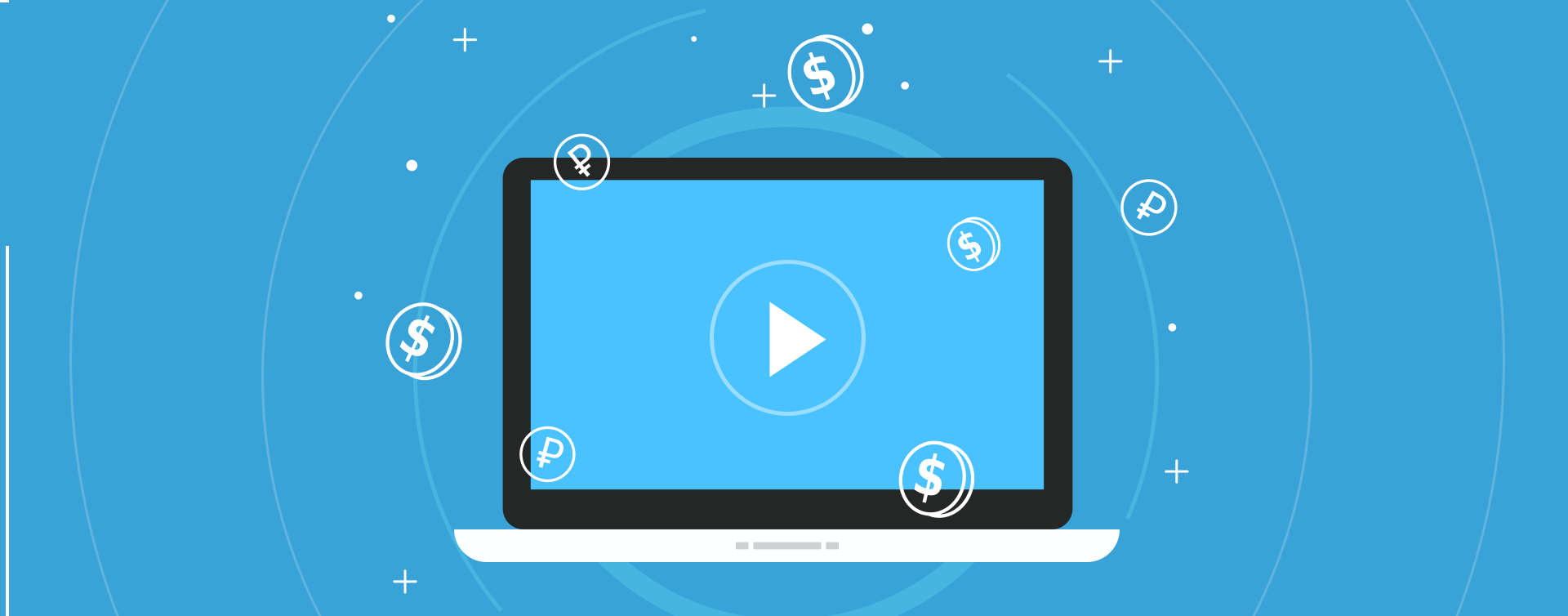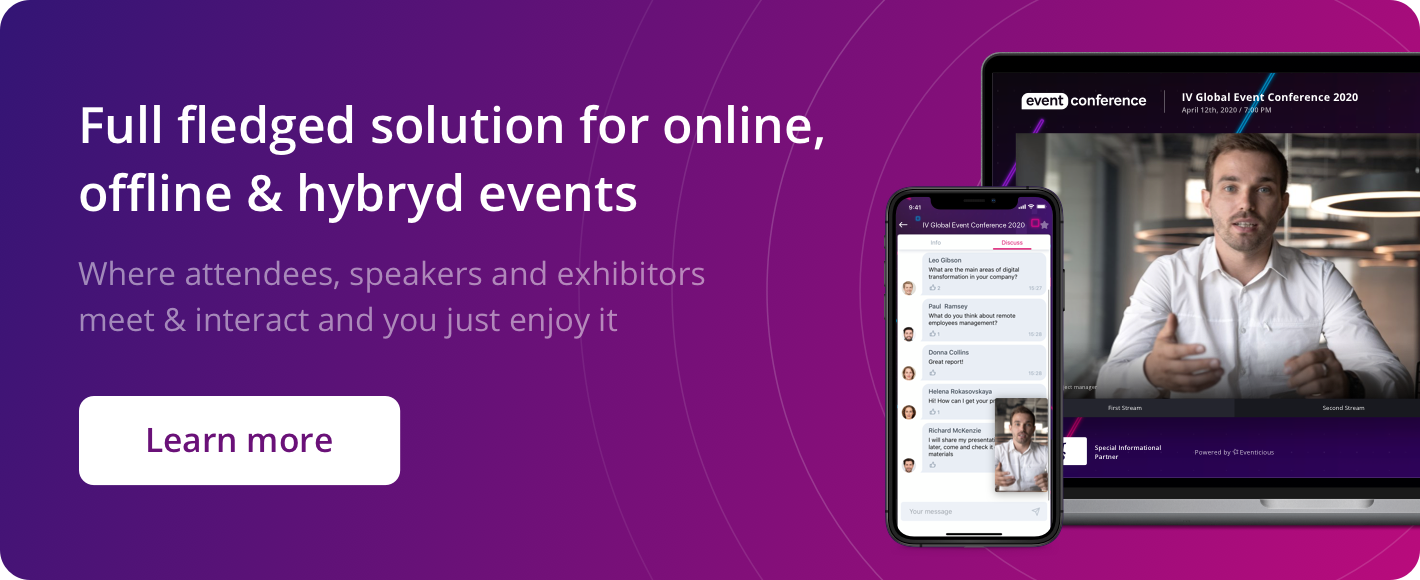Due to the current crisis in the events industry, event organizers have been forced to expand into the online space, and do it very quickly. By now, everyone has more or less mastered the technical side of online event streaming, but many are still unclear about the most important question, which is monetization.
- How do we make money from an online event? Is there a payback?
- What are the odds of selling attendance fee?
- Is it possible to keep the cost of sponsorship on a par with offline events?
- What additional values need to be given to participants so that they are willing to pay and remain involved?
- How to earn after the event and from one event to another?
- How much does a virtual event cost?
These are all acute questions and in order to be able to move on, we looked at the known tools for holding virtual events and came to 6 possibilities of monetization.
1. Sell attendance
The first and most obvious idea that comes to mind when thinking about ways of monetizing an online event is to move the content and all presentations online and charge money for access to them. The only problem here is that attendees are very reluctant to pay just for viewing content.
According to some research, people who are currently working from home on average spend 4-6 hours on work-related tasks. They have time for self-education and personal development. Having said that, many online educational courses are currently available for free, and there are terabytes of free stuff lying around the web.
You might be able to sell access to an online event only if its subject is very specific and this type of content is not available in open access.
In other cases, it may be more profitable to make attendance at your event free to attract a larger audience and make money from something else. This monetization strategy is mostly used by large international events that have moved online due to the current lockdown.

2. Sell recorded content
The second way to monetize online events is to sell video recordings. Recorded presentations are an asset that can and should be used to make money.
When you are holding an online event, you’ll receive complete recordings of all live streams at no extra charge – this option is provided by the streaming service.
Access to recorded content sells best during the lead up to the event, when its promotional campaign is in full swing, and also during the event itself when many attendees don’t mind paying a little money for access to interesting content that they did not get a chance to view online.
When taking this route, event organizers should plan in advance where to store these recordings, how to process payments, and how to ensure data security and copy protection.
How much money can you make selling recorded content? From our experience, 3-6% of registered attendees will purchase recordings, depending on the price. For an online event with 1,000 participants, this amounts to 30-60 sales.
3. Sell additional features (Freemium model)
Freemium model is widely used in online products. The main product is provided free of charge, and additional features and services are available for a fee. This approach can be easily applied to online events.
You can sell access to special activities, like exclusive master classes or personal consultations. You can even sell tickets to an online party!
This approach can be implemented, for example, via a Web & Mobile event platform. You can set up the Event app and its web version to make different content and different services available to different groups of attendees, depending on the package they purchased. For example, attendees who bought the more expensive package will have access to a networking platform and to contact information of potential business partners.
4. Direct sales
Event marketing works just as well in the online format as in the offline one. Free online events can be monetized by selling other products. Digital, informational and educational products are on the best-selling list at all events. From our experience, the sales conversion rate for the main product among online event attendees is 1-3%.
An important factor for successful sales is being able to get acquainted with the product and purchase it in one click, without getting distracted from the broadcast. The more steps it takes to order a product, the less are the chances that attendees will go through with the purchase.
An online store or order form can be integrated into an online event app. If you already have an online store, all you’ll need to do is place a link to it in the app. If you don’t have one, it can be built quickly using any landing builder, and then you’ll be able to sell merchandise, goods or services in one click.

5. Sponsor integrations
This monetization option will be familiar to almost everyone who has ever organized a public event: sponsor activations. They will also sell at online events. Brands are still interested in introducing themselves and their products to the target audience.
Furthermore, online events have certain advantages as compared to offline ones: larger audiences, the wider geographical spread of attendees, and the ability to track and digitize all interactions with the brand.
While previously many regional events with less than 1,000 attendees did not attract any big brands, now the same events but held online can pull in thousands of attendees.
It also works the other way around: thanks to the online format, brands are able to reach audiences that have never been engaged in offline events before, for example, small-town dwellers.
Below we have listed several possible sponsorship offers:
Live stream:
- presentation
- commercials during breaks
- branded live stream screen
- a drawing for prizes provided by partners
- branded presentations
Mobile app:
- in-app branding
- virtual representation
- questionnaires, surveys, market research
- рush notifications
- “Partners” section
- Built-in store of sponsor services or products. Attach a representative to the company's service for direct contact with him.
- Gamification partnership: prizes from sponsors for most active attendees
Promotions:
- mass marketing emails to the attendee list
- ads in social networks
6. Hybrid events
The online format, which is now being adopted by event organizers, in the future will continue to play an important role in monetization of offline events.
Even when offline events are back, their organizers will most likely face a situation where many potential partners and exhibitors will not be able to afford live participation, due to the crisis.
For them, online participation may become a viable solution. On the other hand, the companies that will decide to attend an offline event will regard its online segment as an added value, the possibility to expand their audience and get more return on their investment.
In any case, in a situation where one has to compete for budgets, the availability of online options will add extra value to any event, which means that it may be a good idea for event organizers to use the imposed down time to channel their professional development in this direction.



